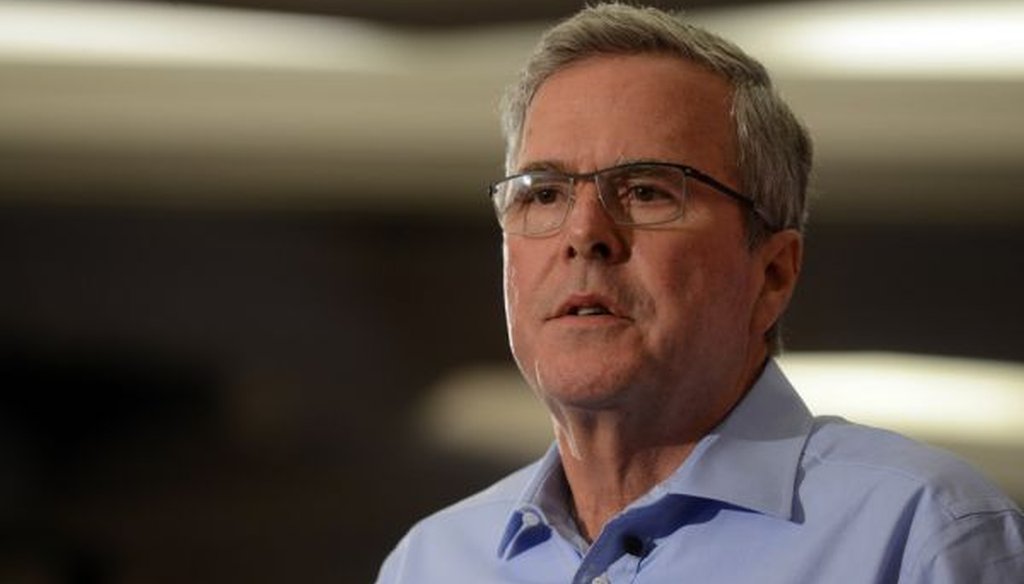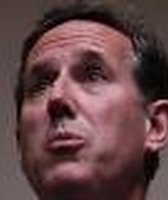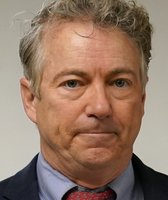Stand up for the facts!
Our only agenda is to publish the truth so you can be an informed participant in democracy.
We need your help.
I would like to contribute

Former Florida Gov. Jeb Bush speaks at the First in the Nation Republican Leadership Summit on April 17, 2015 in Nashua, N.H.
There’s little question that President Barack Obama has faced a rocky foreign-policy landscape during his tenure. But is he philosophically opposed to having the United States take a leading role in the world?
That’s what former Florida Gov. Jeb Bush has said on the stump. Bush is expected to seek the Republican presidential nomination in 2016.
In a speech at the New Hampshire Republican Party Leadership Summit in Nashua, N.H., on April 17, 2015, Bush started out talking about how to make the American economy work better:
"The question that we have in front of us is, are we capable of making disruption our friend, or will it overwhelm us? And that requires the leadership to fix a few big, complex things. None of this is going to be possible, unless we restore a sense of security in the lives of Americans, a sense of security that is based on American leadership in the world.
"This is the first president in the post-World War II era that does not believe that America's presence in the world as a leader and America's power in the world is a force for good. I do, and I hope you do as well."
Bush’s comments that Obama "does not believe" that "America’s power in the world is a force for good" caught our attention. We thought we remembered Obama making high-profile comments expressing just the opposite.
We took a look at Obama’s words and found a number of speeches in which he said something very different than what Bush indicated. We’re not putting this claim on the Truth-O-Meter now, but we will be monitoring campaign rhetoric along these lines to see if it sticks to the facts.
Here are a few examples of Obama’s remarks that praise American action:
• Speech at the graduation ceremony at West Point, May 28, 2014: "America must always lead on the world stage. If we don’t, no one else will. … Let me repeat a principle I put forward at the outset of my presidency: The United States will use military force, unilaterally if necessary, when our core interests demand it -- when our people are threatened; when our livelihoods are at stake; when the security of our allies is in danger."
• Statement authorizing airstrikes and aid for Yazidi minorities in Iraq, Aug. 7, 2014: "Our leadership is necessary to underwrite the global security and prosperity that our children and our grandchildren will depend upon. … When the lives of American citizens are at risk, we will take action. That’s my responsibility as commander-in-chief. And when many thousands of innocent civilians are faced with the danger of being wiped out, and we have the capacity to do something about it, we will take action. That is our responsibility as Americans. That’s a hallmark of American leadership."
• Speech from the White House on combating the Islamic State, also known as ISIS, Sept. 10, 2014: "American leadership is the one constant in an uncertain world. It is America that has the capacity and the will to mobilize the world against terrorists. It is America that has rallied the world against Russian aggression, and in support of the Ukrainian peoples' right to determine their own destiny. It is America that helped remove and destroy Syria's declared chemical weapons so they cannot pose a threat to the Syrian people -- or the world -- again. And it is America that is helping Muslim communities around the world not just in the fight against terrorism, but in the fight for opportunity, tolerance, and a more hopeful future."
• Obama’s Nobel Prize acceptance speech, Dec. 10, 2009: "Where force is necessary, we have a moral and strategic interest in binding ourselves to certain rules of conduct. And even as we confront a vicious adversary that abides by no rules, I believe the United States of America must remain a standard bearer in the conduct of war. That is what makes us different from those whom we fight."
• Remarks on the Ebola crisis, Feb. 11, 2015: We have this extraordinary military. We have an extraordinary economy. We have unbelievable businesses. But what makes us exceptional is when there’s a big challenge and we hear somebody saying it’s too hard to tackle, and we come together as a nation and prove you wrong. That’s true whether it’s recession, or war, or terrorism."
Bush’s response
When we contacted Bush’s camp, they said that while Obama came into office promising to rebuild relationships with the United States’ allies, it’s not clear that he’s succeeded in doing that. They pointed to comments they said show Obama appearing skeptical of the United States’ capacity to lead. They were:
• Speech at the Summit of the Americas opening ceremony, April 17, 2009: "While the United States has done much to promote peace and prosperity in the hemisphere, we have at times been disengaged, and at times we sought to dictate our terms."
• An op-ed by Obama, April 16, 2009: "Too often, the United States has not pursued and sustained engagement with our neighbors."
• Remarks at a town hall in Strasbourg, France, April 3, 2009: "In America, there's a failure to appreciate Europe's leading role in the world. Instead of celebrating your dynamic union and seeking to partner with you to meet common challenges, there have been times where America has shown arrogance and been dismissive, even derisive."
These examples, however, don’t undermine Obama’s comments that the United States has a special leadership role in world affairs.
Even though we aren’t giving this claim a rating, we’re skeptical that a few claims acknowledging past excesses or shortcomings in relations with America’s allies -- most of them spoken early in his tenure -- trumps Obama’s repeated emphasis on the United States’ positive leadership role in the world.
Our Sources
Jeb Bush, remarks at the New Hampshire Republican Party Leadership Summit in Nashua, N.H., April 17, 2015
Barack Obama, statement on Afghanistan, May 27, 2014
Barack Obama, speech at the graduation ceremony at West Point, May 28, 2014
Barack Obama, statement authorizing airstrikes and aid for Yazidi minorities in Iraq, Aug. 7, 2014
Barack Obama, speech from the White House, combating ISIS, Sept. 10, 2014
Barack Obama, Nobel Prize acceptance speech, Dec. 10, 2009
Barack Obama, remarks on the Ebola crisis, Feb. 11, 2015
Barack Obama, speech at the Summit of the Americas opening ceremony, April 17, 2009
Barack Obama, op-ed, April 16, 2009
Barack Obama, remarks at a town hall in Strasbourg, France, April 3, 2009
Foreign Policy, "Who really said Obama was 'leading from behind?' " Oct. 27, 2011
Email interview with Mo Elleithee, communications director for the Democratic National Committee, April 25, 2015
Email interview with Matt Gorman, spokesman for the Jeb Bush-aligned Right to Rise PAC, April 22, 2015






























